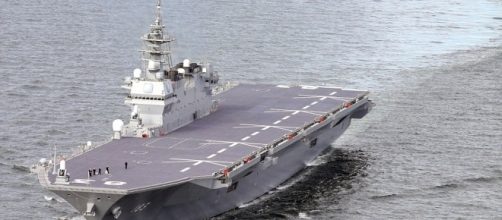Japan has deployed its largest warship, the helicopter carrier, Izumo to escort the US supply convoy heading to the korean peninsula. This is the first naval deployment of a Japanese warship in peacetime since the second world war.
PM Abe passed new legislation allowing naval deployment
After Prime minister, Abe has provided amendments called the security legislation in the Japanese constitution that allows its defense force to not only defend its own assets but also reply to assistance requested by its allies. This amendment came under criticism, as it has effectively broadened the scope of operations the Japanese military can perform overseas and erodes Japan's pacifist constitution.
China's reaction to Japan's growing military presence overseas is not well-accepted
Since the start of the Korean crisis, China wades sorely in an unwanted entanglement of diplomatic limitations. Though Beijing doesn't approve on the show of force by the US and its regional allies, it has to condone unwillingly to the unfolding events.
However, China continues to oppose the increasing US presence in the area and formally desires to return back to the status quo and begin diplomacy anew. North Korea is China's only regional ally and serves as a buffer country against the encroachment of US influence in the Korean peninsula.
Russia on the other hand openly supports China and wants the US to refrain from doing any preemptive strikes on North Korea as it may result in total war.
It is unsure whether Russia will support Pyongyang when conflict erupts, but Putin is sure to side with China in this diplomatic crisis.
Japan vows to help US carrier force until conclusion of joint drills in the Korean peninsula
The Helicopter carrier Izumo will escort an American vessel carrying needed supplies for US troops in the Korean peninsula.
Japan alone has an estimated 50,000 men stationed permanently in the country, added to that the troops in South Korea and the crew of the carrier flotilla sent to the area.
Trump has also started to have dialogues with ASEAN nations hoping to cement ties with these countries. As China continues to increase in influence in Asia, Trump sees fit to challenge this expansion by forming a collection of pro-US nations in South East Asia once more. The eyes of the world are focused now on Asia and how diplomatic tensions are tackled and hopefully solved.


